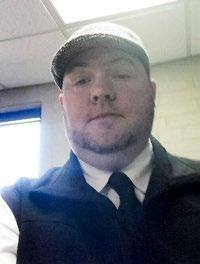
2 minute read
Wichita Dad: ‘Suboxone Saved My Life’ College Athlete’s Pain Pill Addiction Started after ACL Tear
“It doesn’t matter how many pills you have, you’re always worried about running out.”
Bruce Harris of Wichita says the life of a painpill addict is a constant chase — an all-consuming motivation to make sure there is ample medication so you’re never without. Finding pills on the street in Wichita was never a problem, but it put the husband and father in places and with people that weren’t necessarily safe. “You find yourself in places you wouldn’t normally be,” he said. “But that doesn’t matter. I’d have 100 pills and I’d still be worried what would happen when those ran out.”
How a college athlete who never took drugs got to be a 31-year-old junkie is a sad but all-too-common story. Harris tore his ACL playing softball, and post-surgery he was prescribed Percocet. “This was 15 years ago and they were a lot more lenient with pills and how they distributed pain medication then,” he said.
His pain subsided as long as he was on the pills. When he didn’t take them, the pain returned — and so did the excruciating withdrawal symptoms. “I tried a couple of times to quit and the withdrawals were just so bad; I didn’t have the courage to fight through them,” he said. “The pain wasn’t enough that I needed the pills, but the pain I did have disappeared when I took the pills. I just loved the way it made my body feel. I didn’t hurt.”
While Harris said some pain-pill addicts are energized by the medication, it had the opposite effect on him. “Pain pills for me make me kind of groggy and not want to do anything. I was working at Wells Fargo and my job wasn’t physically hard, but if I would have had a physically demanding job it would have been different.”
Grogginess and low energy resulted in extreme weight gain and a diagnosis of Type 2 diabetes for the once athletic Harris. “Over that year I gained 150 pounds from just doing nothing,” he said. He kept his addiction a secret from everyone but his wife. He said he comes from a very conservative Baptist family and it wasn’t something he felt he could share.
Finally, when Harris was taking up to 15 pills a day, he could no longer handle the financial strain and he knew something had to give. “I called a friend of mine who had an addiction problem too. I called her to ask about getting pills, because she was taking like 30 a day and she knew where to get them. And she said, ‘I don’t take them anymore.’ She told me about Dr. (Greg) Lakin. The very next day I was there.”
At Lakin’s clinic, Harris started on Suboxone, a drug that curbs cravings for those with opioid addictions. It was very literally life-changing. “Suboxone saved my life. There is no doubt about it,” he said.

Today he is still on Suboxone, decreasing his dosage slowly over time. He also lost 109 pounds through diet and exercise and is no longer diabetic. Today, he and wife Christe have six children and three grandchildren.
He encourages anyone with a pain pill addiction to seek help. “I would say the majority of people can’t quit on their own,” he said. “Take the time and courage to seek help, whether it’s counseling, treatment or whatever. There’s help out there and it’s affordable.”
He knows many athletes end up going down the same road he did. The wear and tear on an athlete’s body can be extreme, and surgeries often mean prescription painkillers and a risk of addiction. There’s no shame in getting help. Harris is thankful every day that he took the step that helped him get free.
“I tell people all the time, I’ll never go back to pills,” he said. “There’s not a situation on this planet that would get me back to taking 15 pills a day.”










